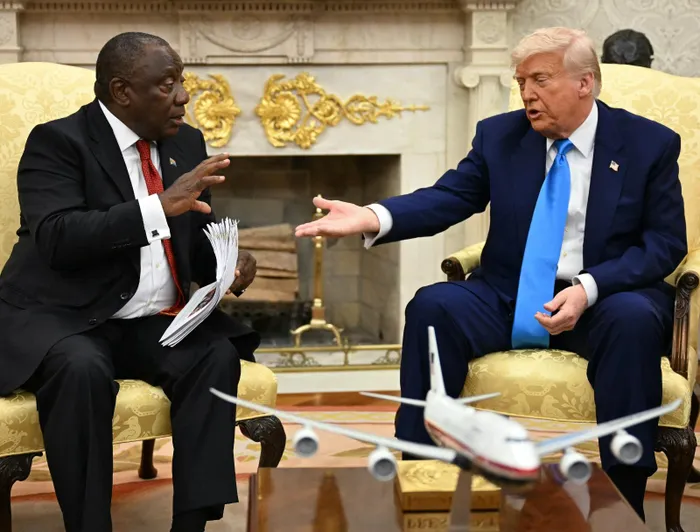The absence of SA's ambassador not to blame for US 30% tariff hike, says Lamola

Minister Ronald Lamola says South Africa’s absence of an ambassador in Washington is not the reason for the 30% US import tariffs.
Image: AFP
International Relations Minister Ronald Lamola said he does not believe South Africa’s current lack of an ambassador in Washington has affected the country’s ability to negotiate an agreement following the United States’ decision to impose steep 30% tariffs on imports.
Speaking at a joint media briefing on Monday at the Germiston Civic Centre in Ekurhuleni, alongside Trade, Industry and Competition Minister Parks Tau, Lamola addressed the diplomatic fallout after former South African ambassador to the US Ebrahim Rasool was expelled in March.
“We had an ambassador in the US and that ambassador was expelled,” said Lamola.
“President (Cyril) Ramaphosa has always prioritised the US in terms of ambassadorial responsibility.”
Lamola said the expulsion has complicated the process of appointing a new ambassador.
“The fact that our ambassador was expelled means that the new process to appoint the ambassador will not be as easy as it would have been when an ambassador had not been expelled,” he said.
“We have to take all careful consideration, all due diligence, and I can confirm that that process is at an advanced stage. The President, at the right time, will announce who will become the ambassador of South Africa to the US.”
Lamola said that the appointment would be made solely by the president, in accordance with the Constitution.
The 30% tariffs, introduced by the administration of US President Donald Trump, are set to take effect at 12:01 a.m. on August 8.
While other African countries, such as Lesotho and Zimbabw,e will face a 15% tariff, South Africa has been singled out for a significantly steeper duty.
Lamola, however, dismissed suggestions that the absence of an ambassador had weakened South Africa’s negotiating position.
“Ambassadors do not negotiate any trade deals,” he said.
“The trade deal is being negotiated under the leadership of the Department of Trade, Industry and Competition (DTIC), with coordination and support from the Department of International Relations and Cooperation (DIRCO).”
Lamola confirmed that South Africa currently has a chargé d’affaires (a diplomat) in Washington who engages with key stakeholders but does not lead negotiations.
“There are countries that do have ambassadors in Washington. They don’t have a trade deal. So, the trade deal is negotiated by the relevant line function department. In this instance, it is the DTIC, which we are supporting, including our chargé d’affaires in the US, who does from time to time point to the relevant people,” he said.
He further rejected claims that the absence of an ambassador directly caused South Africa’s failure to secure a tariff exemption.
“If that were the case, all countries with ambassadors in Washington wouldn’t be having the same challenges we’re facing,” said Lamola. “This is a global phenomenon, not a South African problem.”
Rasool, who previously served as ambassador to the US from 2010 to 2015 during the Barack Obama administration, was reappointed in January 2025 under the Joe Biden and later Trump administrations.
Rasool was dismissed in March after the remarks he made during a webinar hosted by the Mapungubwe Institute for Strategic Reflection (Mistra), under the theme “Implications of Changes in US Administrations for SA and Africa”.
During the event, Rasool urged South Africans to familiarise themselves with the country’s national interest framework, calling it a critical guide amid shifting global dynamics.
Rasool was critical of the “Make America Great Again” movement, linking it to demographic changes in the US and warning of ideological resistance to emerging multipolarity.
He also raised concerns about South Africa’s handover of the G20 presidency to the US.
Meanwhile, Lamola added that Rasool’s replacement was imminent.
“Obviously, the president may consult whoever he deems necessary and prudent to appoint this ambassador. But the process is at an advanced stage,” he said.
IOL Politics